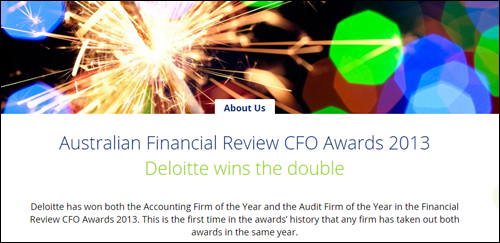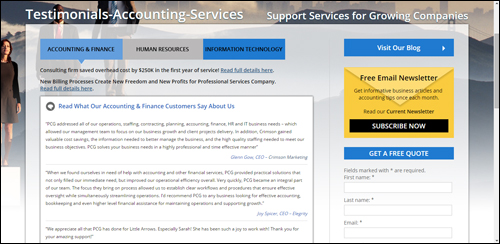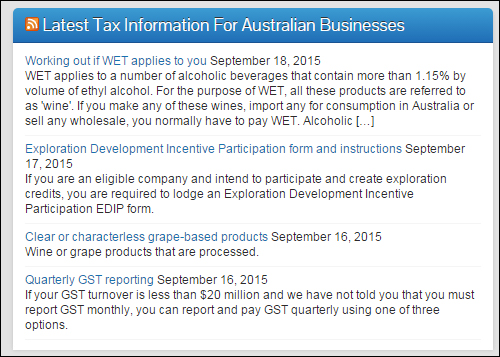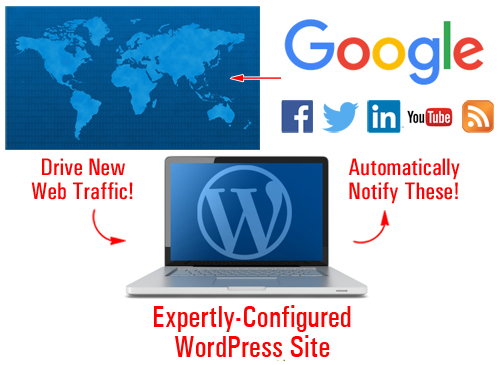Grow Your Accounting Business Online With WordPress
 Accountants today are facing many new challenges created by the web economy.
Accountants today are facing many new challenges created by the web economy.
Online Challenges For Accountants
Today, more than ever, accounting firms must find smarter ways to remain competitive, find new business, and retain current business. Not only do you have to participate in the communities and industries you serve, you must also develop and maintain an active web presence. This includes having a website and learning how to better promote your business services online.
In addition to investing dollars marketing offline, businesses in the accounting industry are also finding that they need to assign a bigger amount of their budget towards the development and management of a website that drives prospects, engages users, outperforms the competition in search engines and social media, and helps create a wider marketing reach online.
This means that your site not only has to look great, your pages have to be fast-loading, and be easy to navigate, but even more importantly, your site’s needs may change over time and many areas will need to be updated frequently. This requires a sound website and content management strategy in place.
One other challenge that accounting organizations face online (as most professions do for that matter), is that your site has only around thirty seconds to give visitors the information they need or they will leave and go elsewhere.
“Websites have evolved into central information hubs where service information is still present but enhanced with web portals, hyperlinks to state and federal sites, and a variety of free tools.”
Michael Alter, http://www.accountingweb.com/technology/accounting-software/tips-for-improving-your-website
Online Opportunities For Certified Public Accountants
As well as facing significant challenges, there are also plenty of online opportunities available to businesses in the accounting sector that are willing to adapt to meet the challenges of the digital economy and can think strategically in terms of marketing themselves better online.
In this comprehensive guide, you will learn ways and opportunities to drive more traffic and create significant improvements in your accounting and financial business presence online.
![]()
As well as providing general website improvement tips, we also recommend that you consider using the WordPress platform to power your accounting or financial services website.
To learn more about the benefits and advantages of using the WordPress Content Management System (CMS), see these articles:
- How A Poorly Constructed Web Site Can Lose You Business
- WordPress For Small Business Owners – An Online Guide To Growing A Successful Small Business With A WordPress Blog
Useful Tips To Improve Your Website
In this section we’ll start with the basics and show you how to improve your accounting website and get better results online. We show you what pages you need, what type of content works best for accounting and financial services sites, suggestions for improving navigation structure, etc.
If you need help with website planning, see this detailed step-by-step guide we have written: A Comprehensive Guide To Web Site Planning For Business Owners
Your Website Pages
Professional business websites need several essential pages. Let’s take a look at these.
Services
It’s essential to have a page that describes your services or products.
Your page should include services such as:
- Business – planning, formation, general accounting, payroll, financial statement compilation, book keeping, budgeting, financing, forecasting, strategic planning, consulting services, etc.
- Taxation – preparation, planning, reviewing, auditing, advising, problem resolution
- Investment strategies
- Corporate finance
- Wealth creation
- Superannuation/retirement plan (401k) advice
- Audit risk assessment and assurance
- Quickbooks – setup, training, tune up, and support
- Specialist services – mergers, acquisitions, information technology, secretarial, rentals, trusts, fiduciary accounting, succession planning, selling a business, transfers, etc.
- Lending and leasing
List all of the services you provide, not just the ones you specialize in. Provide your visitors with information that will educate them about what your services do and direct them to your contact or appointment booking page.
Who We Are
This page needs to describe your business and what your business stands for, its unique approach, philanthropy, etc.
It should mention any awards, certifications, accreditations, recognitions, publications, associations, etc., that could be used to promote your company and position it above the competition.

(List all of your awards accreditations, certifications, recognitions, associations, publications, etc. in the About Us page. Image source: deloitte.com)
Your Team
Are you searching for ideas to grow your business online and get prospects to interact more on your site? Then help visitors get to know you and your business better.
Your business needs to be relatable. A great way to do that is to have a page that introduces your team members. It should include a photo and a brief bio. Since most visitors won’t be familiar with accounting terms your bio descriptions should tell who they are and what their specialties are. It should also explain what those specialties mean. This page should also include social buttons so your prospective clients can follow some of your staff members on their social networks.
On this page, make sure to outline each team member’s experience, how their skills and knowledge add value to your team, and more importantly, how they will help add value to your clients’ business.

(Add a page that introduces your team to prospective new clients. Image sourced from: deepsky.com)
We have written a detailed tutorial about how to create and add a simple and easy-to-maintain list directory of employees in your site using free plugins here: How To Easily Add A Staff List Directory To WordPress: WordPress Plugin Tutorial
Work For Us
This is a listing of career opportunities available within your organization. This page should include type of training provided, benefits, opportunities for advancement, social aspects of working for your organization, etc. It should include stories of trainees who have worked their way up in your organization and information about new career opportunities in the accounting and financial services industry.
Maintain a positions available section in this page. If there are no positions currently available, consider inviting people to return periodically to the page, join your updates list, follow your social pages, etc.
Testimonials
Reviews from clients and case studies are a great way to show prospective clients what kind of financial solutions you are capable of implementing to help them solve their problems. Adding a web page with case studies and reviews from clients also establishes social proof online.

(Add a page to your site with case studies and testimonials from previous clients. Screenshot source: pcg-services.com)
We have written extensively on using testimonials, case studies and client reviews improve your business online. For more info, see this article: Improve Your Sales With Awesome Client Testimonials
Contact Us
A clean contact page is essential.
It should provide visitors with some or all of the following:
- Name
- Location
- Phone
- Fax
- Map
- Web address
- Contact form
- Request for more information – who to contact
- Links to social media pages
- Interactive chat
If your business services different locations you want to make this clear when showing your address and contact info.
Consider also including links to an FAQ section, useful pages, special offers, support page, newsletter opt-in form, blog, etc.
Add A Blog
A blog is a very powerful marketing tool for your business. Most blogging platforms typically include a content management system that is simple to use and allows you to easily promote your business using timely content like announcements, updates, useful information, discussions on current topics, how-to videos, webinars, etc.
If you already have an established accounting website, then consider adding a WordPress blog to promote your business.
If you don’t have a website yet, or your existing website is hard to manage or not giving you the results you want, then WordPress can be used both as your business website and blog.
![]()
Something few businesses know about, is that an expertly configured WordPress site can turn your web presence into an automated traffic machine that can begin attracting new visitors to your site, simply by publishing regular content to your web site.
(WordPress can automate your traffic generation)
Go here to learn more about this: Web Site Traffic Blueprint – Discover How To Turn Your WordPress Web Site Into An Automated Traffic Generation Machine
Legal Pages
Having a compliant website is vitally important, not just for establishing credibility with prospective clients, but also to ensure that no local, regional or federal laws and regulations are being breached wherever your business is located.
Adding some or all of the following legal pages to your accounting site will help keep you out of legal hot water with most regulatory authorities, third-party service providers (e.g. Google), and other potential legal threats or inconveniences:
- Contact Page
- Privacy Statement
- Terms Of Use
- Website Disclaimer
- Affiliate Agreement
- Anti-Spam Policy
- Compensation Disclosure
- DMCA Notice
- Earnings Disclaimer
- External Links Policy
- Health Disclaimers
- Refund Policy
- Video/Audio Terms
- etc.
If you want to learn more about adding legal pages to your website, see this article: What You Need To Know About Adding Legal Pages To Your WordPress Site
Tips For Improving The Content On Your Site
In today’s fiercely competitive digital economy, content generosity has become one of the key differentiators for businesses.
By committing to providing great content with advice and tips, you will get your visitors sharing your content and coming back for more. This is a great way to educate your visitors and prospective clients about your business and about using your products and services.
For example, for an accounting business, topics could include:
- Explanations of balance sheets
- Overlooked tax deductions
- Directors’ duties and legal responsibilities
- How to present accounts for non-profit activities
- Business cashflow planning tips
- Business insurance
- Risk protection
- How to structure a self-managed retirement fund
- Things to look for when … (e.g. purchasing insurance, claiming business expenses, etc.)
You can also create a series of educational articles that will help your your prospective clients understand your accounting services, such as software accounting, small business accounting, business auditing, reducing debt, understanding financial conventions, etc.
Remember to use the same keywords in your articles that your prospective clients would search for online.
![]()
We recommend subscribing to our Content Marketing Email Training Series. You will receive regular training emails with easy-to-digest information and practical tips that will teach you how to drive more traffic to your website, save money creating high-quality content that will add value to your site visitors and grow your business online using content marketing strategies. It’s not only a great course with loads of useful information, it’s also completely FREE!
Improving Visitor Experience
Improving website user experience (often referred to as UX) helps to keep visitors coming back and using your site. This section will show you ways you can improve your visitor engagement and UX.
Add RSS Feeds
RSS feeds provide plenty of benefits for your accounting business.
If you provide content that adds value to others, other businesses may want to syndicate your content.
Some of the benefits of syndicating your content to other businesses using RSS feeds, include:
- All of your updates are in one place
- Content distribution doesn’t rely on email
- Can be shared
- Feeds allow for subscribing
- An RSS feed provides links back to your site
- Your feeds can be submitted to RSS directories and aggregators
- RSS provides several ways for your readers to receive your content (e.g. view your content on their mobile device using feed readers)
- It’s built into WordPress
There are also a number of benefits to adding syndicated content to your website from other websites, such as the fact that you don’t have to write, manage or update the content.
You can find RSS feeds with loads of useful content by visiting sites of relevant government departments or well-known industry bodies.
Below we have listed examples of useful RSS feeds you could add to your website:
- Taxation Policy Center: http://www.taxpolicycenter.org/press/rss.cfm
- Australian Taxation Office: https://www.ato.gov.au/RSS-news-feeds.aspx
- Canada Revenue Agency: http://www.cra-arc.gc.ca/rssfeeds/
- UK HM Revenue and Customs: http://www.hmrc.gov.uk/rss/rss.htm
- South Africa Revenue Service: http://www.sars.gov.za/Pages/RSS-Feeds.aspx

(Using RSS feeds can help to improve your accounting site’s user experience.)
Checklists & Forms
Checklists and forms are a great way to increase user engagement and add value to your audience. Forms and checklists can provide users with useful step-by-step instructions and resources to complete a task. Checklists and forms are also great business planning tools.
You can provide forms and checklists (or links to these) covering a range of subjects such as:
- How To Set Up A Company
- Rental Property Checklist
- Fundraising Activity Checklist
- Disclosure Checklists
- Company Tax Checklist
- Self Managed Super Fund Tax Checklist
- Income Tax Variation Forms
Add Unique Tools
Providing useful online tools, gadgets and applications for businesses (or links to these tools) on your website is a great way to increase visitor engagement and add value to your users. Calculators, such as loan and tax calculators, are popular tools for accounting websites. Other tools could include time cards, and retirement and interest calculators.
In part two, we will be discussing a number of WordPress-based tools you can add to your accounting or financial services website that improve your search engine optimization, improve user engagement and generate more visitors to your business.

***
This is the end of part one of this article on ways to build your accounting business web presence.
Click on this link to read the rest of this article:
![]()
Subscribe To WPCompendium.org And Get Notified Of New Tutorials!
***
***
"If you're new to WordPress, this can stand on its own as a training course and will stay with you as you progress from beginner to advanced and even guru status." - Bruce (Columbus, Ohio)
***
